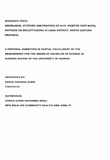| dc.description.abstract | This research will be carried out in the North Eastern Province of Kenya to assess the knowledge, attitude and
practice of HIV positive post-natal mothers towards breastfeeding.
It is a descriptive cross-sectional study conducted using qualitative and quantitative methods of data collection
which will be semi-structured questionnaires containing both open-ended and closed-ended questions, as well as
focus group discussions.
The study population will be HIV positive post-natal mothers of ljara District in North Eastern Province. This area is
home to approximately 1 million people, the majority of who are ethnic Somalis entrenched in nomadic and seminomadic
lifestyles.
The broad objective of this study is to assess the Knowledge, attitude and practice of Hiv positive post-natal
mothers towards breastfeeding and the specific objectives are: To determine the knowledge of HIV positive postnatal
mothers towards breastfeeding, To explore the attitude of HIV positive post-natal mothers towards
breastfeeding and To identify factors that facilitate or impedes HIV positive post-natal mothers' practice of
breastfeeding.
The inclusion criteria will be all HIV positive post-natal mothers who have resided in Ijara for more than 6 months,
respondents between15-49 years of age and respondents who have informed consent Exclusion criteria will be
visitors to the study area who are HIV positive and post-natal, respondents below the age of 15 years or above 49 years of age, respondents who don't have informed consent and respondents who have consented but want immediate gain, whether financial or material.
The sample size will be determined using Fischer's formula and the sampling procedure will be based on multistage sampling. Eight BScN students will be trained as research assistants and they will be trained on ethical considerations, how to establish enumerator-participanfs relationship and how to answer the questionnaire.
The data collection instruments will be pre-tested in Mandera district first to validate and verify clarity of questions and improve reliability of the study tool. Mandera district will be used because it is similar to Ijara in terms of socioeconomic and environmental factors.
After data is collected it will be screened for completeness and then analyzed using S.P.P.S (Statistical Package For Social Sciences).The data will then be presented in the form of pie charts, graphs, and tables for easy understanding of the relationship between knowledge, attitude and practice of HIV+ve post-natal mothers towards breastfeeding.
The study will be beneficial to health workers in this region as they will be able to know the determinants of knowledge, attitude and practice of breastfeeding among HIV positive mothers in the region and hence, they will be able to counsel them accordingly.
The study will take a duration of approximately 6 months and the expected budget is Kshs.229, 500 | en_US |
| dc.description.department | a
Department of Psychiatry, University of Nairobi, ; bDepartment of Mental Health, School of Medicine,
Moi University, Eldoret, Kenya | |

